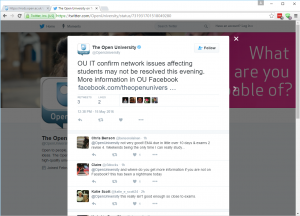A few weeks ago, I mentioned that I was going to do some preparation for studying at the Open University. It’s a distance learning university, which I’ve struggled with in the past due to poor communications tools before technology improved them. I’ve been out of formal education for over 20 years, though I have spent a few years employed as a trainer for computer and network troubleshooting. (I also was assigned one class to train people how to take care of flowers. It was a fun job.)
I initially tried by studying materials for a CCNA in hopes that it would make T216 easier and faster. I made decent progress in learning, but realised that I was only reading the materials. I wasn’t taking active notes, I wasn’t practicing anything hands-on, and while I was absorbing the concepts very well, I wasn’t likely to be able to retain details which would be necessary for the CCNA exam.
So far as my original goal, this was great. Being comfortable with the concepts when I take T216 will indeed make it easier. But it underscored that my method of study wasn’t going to cut it at university. I realised that I had a golden opportunity between now and the course beginning in October to study how to study, to raise my abilities of learning to get the most I can out of my degree course.
After some doing some online searches, talking to a few people (only online, goodness that would be an awkward conversation for me in person), and heavy doses of self evaluation, here’s my plan for university study preparation:
Resources:
- The Good Study Guide by Andrew Northridge, published by the Open University
- This was the first recommendation to me, specifically to help with writing essays at university level. I am not reading it as a book; I am using it as a study resource and practically the basis for my own self-taught module. I initially devoted about an hour a night to study with it, and now go back to it as necessary to do some activities and reflection. Though I started with it, I couldn’t complete it without finding other things to study, because it works best with real examples of your work on courses. The Open University no longer sells this book, but it’s available through Amazon or other avenues.
- OpenLearn badged courses
- After the Good Study Guide stalled because of lack of coursework, I moved to MOOCs. I started with badged OpenLearn courses. I’ll evaluate these courses at a later date, but they’re of varying quality and usefulness to study preparation. In general, they’re better for experience than they are for what you actually get out of them. For example, I was hoping to get some maths refreshers or maybe push myself a bit, but the badged courses for maths are well below university level and can be done fairly easily by anybody who stayed awake through GCSE or high school maths.
- Other MOOCs (Massive Open Online Courses) for fun
- Realising that the experience of the modules were more useful than the knowledge in the modules, I expanded to FutureLearn just to find courses that looked interesting. I’ll evaluate these later, too.
Method:
- My strategy is to treat what I’m doing as seriously as I can. When I enroled to the Open University, I determined I could set aside about 16 hours a week. Thanks to The Good Study Guide, I’m now closer to being able to set aside about 24. During my study preparation, I’m taking half of the initial figure and devoting that to my studies. For an hour an evening and a couple of extra hours on the weekend, I go to the study space I’ve set up, close the door, and do some serious studying. Most of the time is on the MOOCs, but I also devote a fair amount to the Good Study Guide so that I’m sure my skills at studying are actually improving.
Outcome:
- I’ve been extremely pleased with the results of this initiative so far. Perhaps the best thing to come out of it has been the boatloads of confidence that it’s given me. I’ve proven that I have at least half the time that I’ve set aside for study, and that I can stick to it at least for a few weeks. I’ve also learned that I really, really enjoy studying. If I were to cancel my degree course right now, I’d be quite happy to continue to do the MOOCs with the same level of consideration and seriousness.
If anybody is considering going back to learning, I highly recommend this method. You don’t have to use the Good Study Guide, but I would recommend finding some specific guide, and preferably one that helps you analyse your own strengths and weaknesses in relation to course goals.
